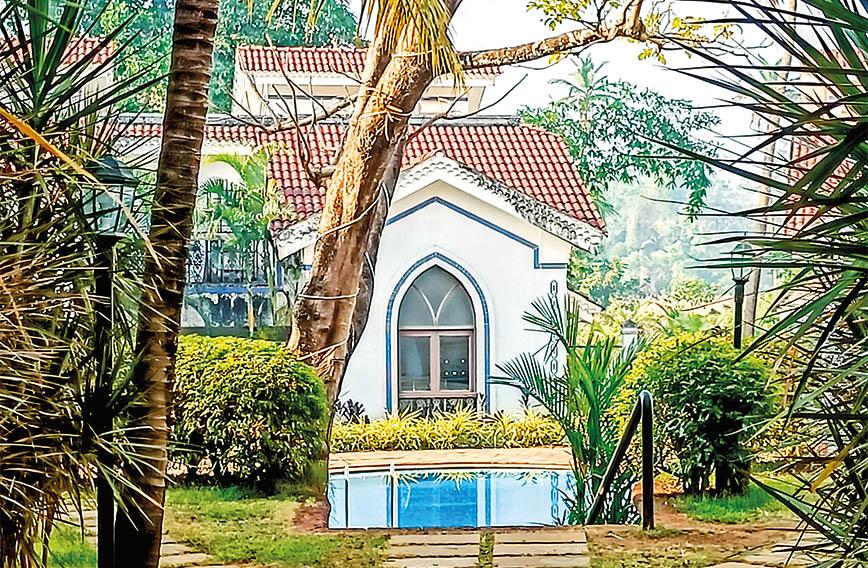
Waving coconut fronds, palms
In Goa, there is a better life for those who seek it
Anita Anand, Goa
Picture this. Waking up in the morning, pulling back the curtains, opening the double doors, and looking into fallow rice fields. Closer to the doors are waving coconut fronds, a betel nut palm, and other trees in the distance. In the rice fields, buffaloes graze, and white and black egrets keep them company. A few weeks ago, the bright orange-red gulmohar bloomed in the distance, contrasting sharply with the green.
This is waking up in the north Goan village of Revora. Every forty-five minutes, the train, which we can see from the back of the house, whizzes past, beyond the fields.
There are birds and bird calls. I have downloaded an app called Merlin, which records the bird calls and tells you what the bird is. I can also take a picture, and the app identifies it. Amazing!
I descend the stairs to the ground floor and look out of the large front window that opens into the complex. The sun streams in, and the day begins.
Walking towards the kitchen, the back door is open, and I look out into the rear of the complex, three steps down the back verandah. I step outside to check the pots with the herbs I planted several weeks ago, and they are dry. The sun is fierce. It is April, and I am told April and May are the hottest months in Goa. The rains come in June.
I also planted several jasmine (motia) plants, which are doing well. Not doing well is the tall jasmine plant, which was there when we came and filled our home with its exquisite aroma. The leaves started turning brown a few weeks ago, and now they are all brown. I am sad, but that is the nature of nature. Seeds take root, plants grow, shed leaves on and off depending on the season, and then die — just like humans — a sobering thought. When I think about my life, I am at the shedding stage.
The kitchen has a window over the sink. I have always wanted a kitchen sink with a view. I now have it. It overlooks the side of the next home and the path that runs through the entire backyard of the complex. Trees line the boundary wall — mangoes, guava, and curry leaves — making for a splendid view. To the right is another large window, overlooking the banana trees. Inside the kitchen is an island with two stools, where my husband and I have breakfasted every morning. The kitchen is well fitted. I am incredibly fortunate; as a kitchen person, I like a well-appointed one.
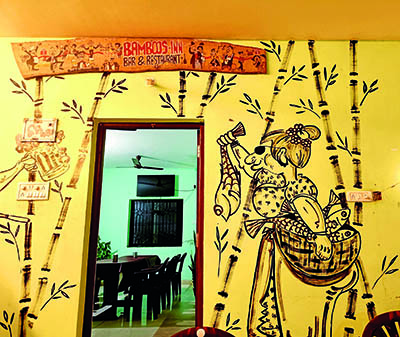 |
| The Bamboos Inn |
I spend more time in the kitchen than in my previous homes in Delhi. There, I had full-time staff who cooked, cleaned, and managed the home for me and my husband. We moved from a 6,000-square-foot home to a 1,800-square-foot one. My husband and I cook, wash dishes, and manage the rest of the house here. Only a part-timer sweeps, swabs, dusts, and dries the laundry.
It is my third month living in Goa. Thirty-four homes in the complex are pretentiously called villas, of which only 20 are full-time occupied. Our front and back doors are open in our waking hours, and the neighbours pop in and out. On Holi, a neighbour came over with a plate of laddoos, which she was making for the first time. There was a get-together that night by the pool with biryani, cutlets, and Holi liquid delights. On Eid, there was an impromptu get-together dinner. A few weeks ago, another neighbour called saying we should expect a Swiggy delivery of ice-cream. She said when new people moved in, she welcomed them in some special way. This was her way. My husband and I were touched.
When we first saw the complex, my heart skipped a beat when I noticed the swimming pool. I love to swim, and one of the reasons I wanted to move to Goa was to be able to swim regularly.
The pool is a gathering spot. We swim and chat, catching up on each other’s news. I like to go into the pool around 6 pm, when it’s cooler. There are tamarind trees at the two ends of the pool. Floating on my back, I see the tamarinds in the tree, birds, and the blue sky with white clouds. As the sun sets, between the villas, the delicate leaves of the bamboo grove shiver in the wind, and the sky turns pink and orange. I love the transition from the sun setting to the appearance of the stars, one by one. A moon, new or full and in-between, is a visual delight against an open sky.
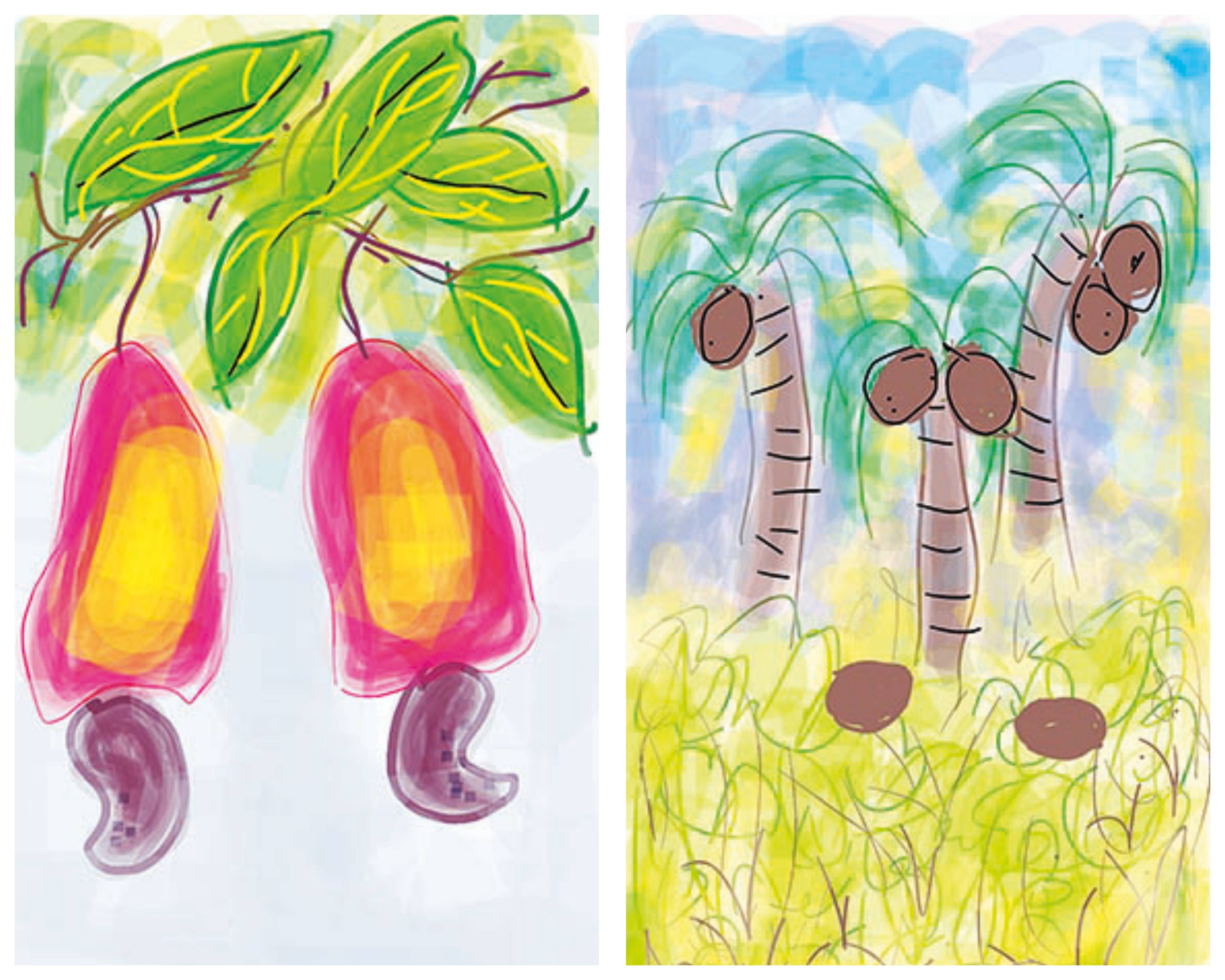 |
| Cashews and coconuts of my new world |
A new space brings new experiences. The local favourite alcoholic drinks are feni and urak, which are made from the cashew fruit. It is cashew fruit season, and the orange-red, kidney-shaped fruit is odd to behold, and the edible nut hangs below it. The fruit is an acquired taste, as it tickles the throat. However, with a bit of salt, many enjoy it. The fruit is the base for urak and feni.
Both urak and feni are produced as small-scale ventures and are not commercial activities. Till March, we only drank feni with a twist of lime, ice, and soda. Now there is urak, a first pressing of the cashew fruit. It is also consumed with lime, salt, and a green chilli sliced down the middle, delicately placed at the rim of the glass. Soft drinks such as Limca or Sprite can be added for those with a sweet tooth. Our feni and urak supplies come from the neighbour who helped us rent our home. The urak season will end by May, and we will return to drinking feni.
Moving into a new place means not knowing much about what is available where. Our neighbours had told us about the Bamboos eatery, just down the road from the complex.
In our first week, one evening we decided to eat there. There were about six plastic tables and chairs, all empty. A man in shorts and a T-shirt stood in the middle of the restaurant. We sat down and asked for a menu. “We are closed,” he said. “It’s Monday.” Oh, we said. We said we were new and did not know about the closing. He asked what we wanted, and we said whatever you have. He said he could do a butter garlic fish, vegetables, and chips. Done, we said. He offered feni, which we accepted. It was a delightful meal, and since then, we have been loyal customers, frequenting the place, taking our friends, and enjoying the benefits of home delivery. They also make a mean crème caramel — no other dessert.
Driving around, barber shops are a common sight. Down the street from us is one such shop, always with customers. Those waiting are drinking tea or reading newspapers. Savitri Café, the teashop next door, makes the tastiest onion and chickpea flour pakoras or fritters, which they call bhaji, only in the evenings. We call Srikant, the owner, and he starts to make them. He calls us when they are ready, and my husband fetches them. They are the best.
Before moving to Goa, friends warned us about the challenges of living here: no Ubers or Olas, expensive taxis, difficulty finding household help, and almost impossible to get people to iron clothes. Our experience was a little different. We rented a car till we bought one, as our vehicle in Delhi needed to be retired. We got household help on the second day we moved in, and in a week, we located an ironing service. Vithanth, who irons clothes, picks up our clothes on his bike and returns them in a day or two. The ironed clothes are wrapped in the local newspaper with a white string tied to keep the clothes and the paper packaging in shape. Vithanth tells me he lives with his brother and sister-in-law. His house is on the main road, and he can be seen ironing when we go past.
Our neighbours introduced us to Vishwanath, the fish man, who, when called the evening
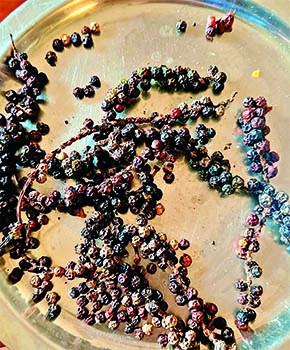 |
| Peppercorns drying in the back verandah |
before, will deliver the cleaned fish to our doorstep the next morning. We have benefited from deliveries of fresh and tasty prawns. They also introduced us to Sita Bakery, where Vallabh makes large loaves of sandwich bread, wrapped in newspaper and tied with a string. He bakes on Sundays, and the loaves can be collected by 11 am. If you want a loaf during the week, call him beforehand. We gave up eating white bread decades ago, but his bread makes great sandwiches, so we have become a white bread sandwich household.
I like the street vendors who sell fresh vegetables, fish, the catch of the day, and the famous Goan bread called poi. Poi is sold by young men at various neighbourhood spots, with plastic bags of poi tied to their bicycles. We enjoy the local bananas, especially the elaichi (because they look like cardamoms). It is the mango season, and the local varieties are delicious. The much sought-after Alfonso mangoes have been in the market for about a month.
Last month, the complex’s caretaker couple propped up a tall ladder against the tree behind our villa. I asked what they were doing. They said they were getting the peppercorns off the vine wrapped around the palm tree. “Want some?” they asked. Yes, I said. It’s the first time I’ve seen the green or unripe peppercorn. I washed them and put them out to dry in the back verandah until they turned black.
Goa attracts migrants. Two years ago, Aarti, our part-timer, migrated from Odisha to Goa with her husband, Benny, and their five children, aged eight to 19. The caretaker couple of the complex is from Nepal. The two young men who came to instal the air conditioners in our home are from Gorakhpur, Uttar Pradesh. I asked how they were in Goa, and they said, “There is not much AC activity in Gorakhpur.” Our hairdresser is from Manipur. He says he prefers Goa to Manipur as there is too much conflict there. He would like his mother to live with him, but she prefers to be in Manipur.
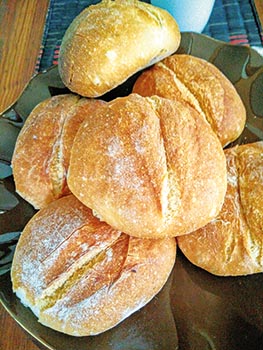 |
| Poi, the traditional bread |
My husband and I, too, are migrants. We moved to Goa because we wanted a different life — a greener, less polluted, less congested life with less concrete, a smaller population, and more diversity. Visiting our friends who had migrated from cities, we saw a life we thought we could have and enjoy. We wanted to downsize, economize on our lifestyle, and spend the last years of our lives in a congenial and desirable environment. Goa provides us with this and more — a rural environment with an urban feel.
When friends learned of our planned move, they said we were courageous. Now that we are in Goa, people say we are courageous. The subtext could be: Aren’t you a little old to be doing this? We are in our mid-seventies. But that did not stop us from making the move. After living in the Delhi area for 34 years, we were ready for a change.
And we chose Goa, deliberately.
Comments
-

Chandralekha Anand Sio - June 8, 2025, 11:36 a.m.
Happiness is the essence of life.So glad you have achieved it in your new surroundings in Goa. Sounds great.All the best Anita and Mahesh
-

Vandana Malik - May 31, 2025, 6:04 a.m.
Loved getting in touch with your Goa life dear Anita and Mahesh! Miss seeing you in apni Puran dilli though!
-

MALA TANDAN - May 30, 2025, 10:05 p.m.
Brilliant how the pieces of the jigsaw puzzle called Goa have been pieces together... thoroughly enjoyed the reading Anita:)
-

Angela Povo - May 30, 2025, 10:52 a.m.
This is what Goa exactly is. There may be a few hiccups, but once you get over it, you enjoy the susegad life. Viva Goa...
-

Reena Mohan - May 29, 2025, 1:04 p.m.
Delightful article
-

Lionel - May 29, 2025, 12:22 p.m.
Beautifully worded..make our cosy commune feel paradise.. which it kinda is ;)





